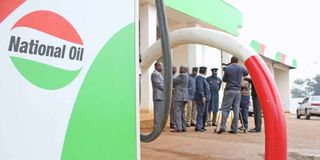Broke National Oil needs Sh7.5bn bailout - report

Police officers at a National Oil petrol station in Nyeri after it was broken into and Sh200,000 stolen in 2015. Report says the company is over-staffed and mismanaged.
What you need to know:
- Another option, according to the report, would be to wind up Nock under Insolvency Act No. 18 of 2015.
The amounts needed to keep Nock afloat comprise Sh5 billion in debt, Sh2 billion in net working capital gap and Sh0.5 billion as expected operational losses until June 2021.
The National Oil Corporation of Kenya (Nock) has sunk into Sh7.5 billion financial rut, adding to the burden taxpayers will bear to rescue the state-owned oil marketer.
A business analysis carried out by consultants hired by two local banks that have been funding the parastatal show that the amount will be needed to keep Nock running in 2021, without which the agency will collapse.
The consultants, who were commissioned by Kenya Commercial Bank and Stanbic Bank Kenya, to carry out a business review of the state oil marketer now recommend that the agency should be wound up or restructured before any funding is given to avoid the risk of further losses.
Leadwood Energy and Kurrent Technology wrote in the review on Nock that the firm is riddled with operational inefficiencies, is overstaffed and mismanaged, making any funding in its current status a potential loss.
Sh7.5 billion
“The estimated total funding gap as at June 30 is Sh7.5 billion. The consultant’s observations are that Nock is technically insolvent, and any additional credit lines to it should only be after deficiencies have been satisfactorily addressed,” reads the report presented before the National Assembly Committee on Energy.
The amounts needed to keep Nock afloat comprise Sh5 billion in debt, Sh2 billion in net working capital gap and Sh0.5 billion as expected operational losses until June 2021.
The state agency was found to be technically insolvent, not generating enough revenue to sustain its operations including salary obligations and had weak stock management and financial controls.
The report also recommended that the government can seek to have an investor take over the firm’s downstream operations but with substantial capital injections from taxpayers after years of pilferage by staff and management.
The consultants, however, warned against injecting money into Nock until an overhaul of the information and communications technology systems is done to ensure effective stocks control.
Other reforms needed include improved stocks accounting/controls systems and improved downstream management experience and expertise are.
Insolvency Act
Another option, according to the report, would be to wind up Nock under Insolvency Act No. 18 of 2015.
The downstream operations where the firm runs fuel stations and cooking gas sales was found to have a surplus workforce of about 30 per cent, which is beyond the real needs of a marketing company the size of Nock.
There were also various manual interventions in the order process creating loopholes for pilferage by staff who occasioned frequent delay in delivery of products to merchants.
Nock LPG cylinders were found to be unpresentable and lacking vision appeal after painting and image faded off in most of them as consumers complained over poor performance of the LPG burners supplied by the company.





